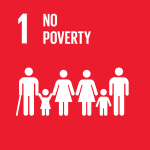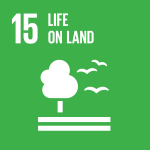
Situated in the South Pacific Ocean, Vanuatu faces a high risk of tropical cyclones, experiencing between 20 to 30 events each decade, with around 1 in 5 causing severe damage. The devastation wrought by Cyclone Pam in 2015 – which claimed 11 lives, damaged or destroyed over 17,000 buildings, and displaced 65,000 people – underscored the urgent need to strengthen resilience. The estimated economic loss amounted to 64 percent of the nation’s GDP.
As sea levels rise and temperatures increase across the Pacific, the frequency and intensity of such extreme weather events are expected to escalate, making it more critical than ever to invest in long-term resilience.
One of the leading forces driving this effort at the grassroots level is the Santo Sunset Environment Network (SSEN), an Indigenous-led coalition of environmental stewards dedicated to protecting both ecosystems and communities. Supported by the UNDP-Adaptation Fund Climate Innovation Accelerator (AFCIA), SSEN is advancing a locally driven, multi-pronged approach to climate adaptation across 42 villages on the west coast of Espiritu Santo, Vanuatu’s largest island. Their efforts span a wide range of community-based solutions, from restoring ecosystems and reviving traditional agriculture to expanding digital connectivity and building disaster preparedness.
A key initiative is to bring Internet access to remote villages across Western Santo, including Tasmate and Nokuku, enabling communities to access vital meteorological and environmental data, facilitating more informed, timely responses to climate threats. At the same time, SSEN is supporting communities to implement practical adaptation measures: planting coastal vegetation to buffer against storm surges, establishing backyard gardens to mitigate landslide risk, and creating Community Conservation Areas (CCAs) to preserve forests and biodiversity.
Crucially, SSEN has trained 89 Indigenous climate rangers in mapping and monitoring techniques that help identify vulnerable areas and guide both adaptation planning and emergency response efforts following extreme weather events.
These rangers play a central role in strengthening food security, restoring degraded lands, and supporting local livelihoods.
Climate resilience in action: Tasmate village launches community conservation area
Tasmate is one of 42 villages along the west coast of Espiritu Santo pioneering efforts to protect people and nature. From 2019 to 2020, the village, including chiefs and landowners, established a community conservation area covering more than 4,000 hectares.
“In my village, SSEN has helped us to maintain the management and use of our conservation area. It covers a land of over 4,000 hectares and was formally registered under the Vanuatu Department of Environmental Protection and Conservation in 2022.” – Chief Titus Rojo, Tasmate village
The conservation area contributes to the community well-being by providing sustainable timber for housing and promoting food security through wild harvesting and improved livestock health.
Santo Sunset rangers provide ongoing support by monitoring local gardens and farms. Mapping data extracted from tools such as OruxMaps, GPS apps and Mapeo toolsets informs decisions about crop types and planting locations, allowing communities to cultivate traditional climate-resilient crops such as water taro and yam.
By processing surplus crops and wild resources, the community is creating added value and unlocking new income opportunities. With support from the rangers, locals are learning to produce and market goods such as wild honey, ginger beer and virgin coconut oil. Women and men are engaging in traditional crafts —such as weaving and carving – using locally sourced materials.
“We engage in innovative value add products, such as wild honey, ginger beer and virgin coconut oil productions, for home consumption, as well as selling to earn money from outside markets. Also, both the women and men are engaged in craft making utilizing local resources.” – Chief Titus Rojo

Left: Chief Titus Rojo from Tasmate village. Photo: SSEN. Right: Traditional preparation of yam pudding. SSEN has been supporting communities to revive traditional agricultural practices as a means of boosting food security and climate resilience. Photo: SSEN
Communities share knowledge on climate-smart agriculture
To celebrate and build on the progress made across the villages, communities came together to host their first mini climate agriculture show in Nokuku village—a five-day event that attracted around 1,000 participants.
The event focused on practical knowledge sharing and Indigenous expertise, with local leaders distributing educational materials on crop management, climate adaptation, soil fertility and seed preservation. Workshops introduced resilient crop varieties such as the locally bred King Yam and guided participants in preparing local vegetable seeds such as tomatoes and cucumbers.

Left: Local seeds preservation process demonstration. Photo: SSEN. Right: Showcasing some of the vegetables grown within the community. Photo: SSEN.
Speakers also highlighted the importance of cultural practices, women’s leadership and finding sustainable ways for communities to earn a living, emphasizing the value of inclusive community decision-making.
Santo Sunset Executive Member Chairman, Allan Taman, described the event as a milestone for building community resilience.
“We believe the key farmers who attended and displayed their products, especially the lead women farmers, learnt and gained a wealth of resilience knowledge and experiences in adaptive local and introduced food crops, such as yam and cassava varieties.” – Taman
The event’s outcomes benefited the region’s 5,000 residents, many of whom exchanged planting materials, learned new techniques or earned income by selling locally made products.
An example for other island nations
Following the agriculture show, a Chiefs Summit was held in Tasmate, convening 80 community leaders to discuss long-term sustainability and climate resilience strategies. Priorities included maintaining internet connectivity and expanding ranger training.

Refresher training for Indigenous Climate Rangers. Photo: SSEN
“We are thankful to be part of the innovative measures to sustain our livelihoods, considering the threats of climate change impacts. It has enabled us to collaborate and engage with our people.” – Chief Titus Rojo
The story of Vanuatu’s climate adaptation efforts, led by the Santo Sunset Environment Network and supported by resilient local communities, offers a powerful example of how Indigenous knowledge, community leadership, and innovative solutions can come together to safeguard both people and nature. By protecting forests, restoring traditional agriculture, improving connectivity, and fostering collaboration, these villages are not just responding to the threats of climate change — they are building a sustainable, self-reliant future. As the climate crisis continues to challenge island nations across the Pacific and beyond, Vanuatu’s experience stands as an example of community-driven resilience and a model for adaptation that other vulnerable regions can look to for inspiration.

Participants at the Chiefs Summit in 2023. Photo: SSEN
Supported by financial contributions from the Adaptation Fund and the European Union, the UNDP-AFCIA programme has awarded 44 micro and small grants to locally led organizations across 33 countries worldwide, accelerating their innovative solutions to build resilience in the most vulnerable communities.
UNDP-AFCIA is one of two featured programmes under the Adaptation Innovation Marketplace (AIM), a multi-stakeholder strategic platform that promotes scaled-up adaptation at the local level.



